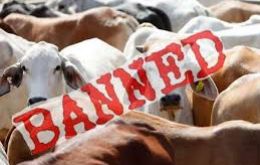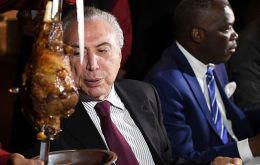MercoPress. South Atlantic News Agency
Tag: Brazilian beef
-
Monday, April 3rd 2017 - 13:27 UTC
Irish farmers want meat removed from Mercosur/EU trade talks

The Irish Farmers’ Association (IFA) is pushing to have meat removed from the proposed trade deal between Europe and Mercosur in the wake of Brazil’s meat scandal. The move could scupper the entire trade deal given the importance of the meat industry to Brazil, Argentina, Uruguay and Paraguay.
-
Tuesday, March 21st 2017 - 10:15 UTC
China, EU, Korea, Chile suspend beef and poultry imports from Brazil

The fallout from Brazil's rotten meat scandal accelerated Monday when China, a huge market, suspended imports and the European Union and South Korea demanded a partial ban. Another ban on Brazilian meat imposed by Chile sparked fears of a trade spat between the two South American partners.
-
Tuesday, August 2nd 2016 - 06:35 UTC
Temer hails beef agreement with the US; expects sales to reach US$ 1b next year

Brazil's acting president, Michel Temer, on Monday hailed the opening of the U.S. market to Brazilian beef, saying that it will help create new jobs and will expand trade for Latin America's largest economy.
-
Tuesday, August 2nd 2016 - 06:19 UTC
US and Brazil agree to open each others' beef market

The United States and Brazil have agreed to allow access to each other's beef markets after more than a decade of negotiations. Brazil's Ministry of Agriculture, Livestock and Food Supply has agreed to imports of U.S. beef for the first time in 13 years, USDA announced today. And the U.S. will accept Brazilian beef for the first time since 1999.
-
Friday, December 20th 2013 - 06:41 UTC
Brazil expects to begin exporting matured beef to the US in first half of 2014

Brasilia and Washington have taken the latest technical steps to open the US market to Brazilian beef, which if all runs smoothly together with a 60 to 90 days public consultation period could see the first shipments in the second quarter of next year. Currently because of sanitary barriers linked to Foot and Mouth Disease, FMD, Brazil can only export industrialized beef to the US.
-
Wednesday, December 19th 2012 - 01:38 UTC
Saudi Arabia joins Japan and China, suspends imports of Brazilian beef

Saudi Arabia has suspended imports of Brazilian beef, Brazil’s agriculture ministry said Tuesday, and became the largest country to stop purchases after confirmation of a 2010 case of atypical mad cow disease.
-
Tuesday, December 11th 2012 - 19:04 UTC
Atypical BSE case detected among grass fed cattle in south Brazil

A scientific commission from the World Organization for Animal Health, OIE, will commence in February to study the case of atypical Bovine Spongiform Encephalopathy, BSE, reported in the south of Brazil among a herd of animals fed on grassland.
